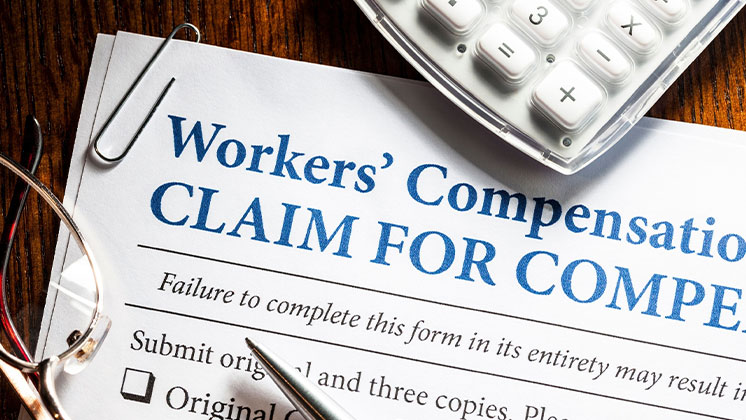How to File a Workers’ Compensation Claim in Virginia: Step-by-Step Guide

Filing a workers’ compensation claim in Virginia can be a complex process, but understanding the steps involved can help ensure you receive the benefits you’re entitled to. This guide will walk you through the process, from reporting your injury to filing your claim and beyond.
1. Reporting Your Injury
The first crucial step in the workers’ compensation process is reporting your injury to your employer. Virginia law requires that you notify your employer of a work-related injury or illness within 30 days of the incident or diagnosis. However, it’s best to report to your employer as soon as possible to avoid any potential issues with your claim.
When reporting your injury, keep these in mind:
- Inform your supervisor or employer in writing.
- Include the date, time, and circumstances of the injury.
- Be specific about the nature and extent of your injury,
- Keep a copy of the written notice for your records,
Prompt reporting not only complies with legal requirements but also helps initiate the claims process more quickly, potentially expediting your access to medical treatment and benefits.
2. Seeking Medical Attention
Immediately after your injury, it’s essential to seek appropriate medical treatment. In Virginia, your employer may provide a panel of at least three physicians from which you can choose for your initial treatment. If your employer fails to provide this panel, you may have the right to select your own physician.
When seeking medical care:
- Inform the healthcare provider that your injury is work-related.
- Follow all treatment recommendations and attend all scheduled appointments.
- Keep detailed records of all medical visits, treatments, and expenses.
Proper medical documentation is crucial for supporting your workers’ compensation claim and ensuring you receive appropriate benefits.
3. Filing Your Claim with the Virginia Workers’ Compensation Commission
Reporting your injury to your employer is not the same as filing a claim. To protect your rights to benefits, you must file a formal claim with the Virginia Workers’ Compensation Commission (VWCC) within two years of the date of your injury.
To file your claim:
- Obtain a Claim for Benefits form from the VWCC website or office.
- Complete the claim form accurately, providing all requested information.
- Submit the form to the VWCC via one of the following methods:
- In person at a VWCC office
- By mail to the VWCC’s Richmond office
- By fax to 804-823-6956
- Online through the VWCC’s WebFile system.
When filing your claim, be sure to specify all injured body parts and any potential occupational diseases. Failing to list all injuries may limit your ability to receive benefits for those conditions later.
4. Employer’s Responsibilities
After you report your injury, your employer has certain obligations in the workers’ compensation process. These include:
- Filing a First Report of Injury (FROI) with the VWCC within 10 days of being notified of your injury
- Notifying their workers’ compensation insurance carrier about your injury
- Providing you with information about your rights and responsibilities under workers’ compensation law.
If your employer fails to fulfill these obligations, it’s important to consult with an experienced workers’ compensation attorney to protect your rights.
5. Claim Acceptance or Denial
Once your claim is filed, your employer’s workers’ compensation insurance carrier will conduct their investigation and decide whether to accept or deny your claim. If your claim is accepted, you should receive an Award Agreement detailing the benefits you’ll receive.
If your claim is denied, you have the right to request a hearing before the VWCC. At this point, it’s highly advisable to seek legal representation to help you navigate the appeals process and present your case effectively.
6. Receiving Benefits
If your claim is approved, you may be eligible for various benefits, including:
- Medical treatment for your work-related injury or illness
- Temporary total or partial disability benefits
- Permanent partial or total disability benefits
- Vocational rehabilitation services.
The specific benefits you receive will depend on the nature and severity of your injury, as well as your ability to return to work.
7. Ongoing Responsibilities After Workplace Injuries
Throughout the workers’ compensation process, you’ll have ongoing responsibilities to maintain your eligibility for benefits:
- Attend all medical appointments and follow prescribed treatments.
- Provide regular updates to your employer and the insurance carrier about your medical status.
- Attempt to return to work in a modified or light-duty capacity if approved by your doctor.
- Report any changes in your condition or ability to work.
Failing to meet these responsibilities could jeopardize your benefits or lead to their termination.
8. Settling Your Claim
In some cases, you may have the option to settle your workers’ compensation claim for a lump sum payment. This decision should not be made lightly, as it typically means giving up future rights to benefits related to your injury. It’s crucial to consult with an experienced workers’ compensation attorney before considering any settlement offer.
The Importance of Legal Representation
While it’s possible to navigate the workers’ compensation process on your own, having skilled legal representation can significantly improve your chances of receiving the full benefits you deserve. An experienced attorney can:
- Ensure your claim is filed correctly and on time
- Help you understand your rights and options
- Negotiate with insurance companies on your behalf
- Represent you in hearings or appeals if your claim is denied
- Advise you on potential settlements.
Attorney Jaleh Slominski of Slominski Law has extensive experience in Virginia workers’ compensation law and can provide the guidance and representation you need throughout the claims process.
Frequently Asked Questions
What should I do if my employer doesn’t have workers’ compensation insurance?
In Virginia, most employers with three or more employees are required to carry workers’ compensation insurance. If your employer doesn’t have the required insurance, you may still be able to file a claim with the Virginia Workers’ Compensation Commission. The Commission maintains an Uninsured Employer’s Fund to provide benefits to eligible employees whose employers failed to obtain insurance.
Additionally, employers who fail to carry required workers’ compensation insurance may face civil penalties and potential criminal charges. If you discover your employer is uninsured, it’s crucial to consult with an experienced workers’ compensation attorney to understand your options and protect your rights.
Can I choose my own doctor for treatment of a work-related injury in Virginia?
In Virginia, your ability to choose your own doctor for a work-related injury is somewhat limited. Initially, your employer has the right to provide a panel of at least three physicians from which you can select for your treatment. You must choose from this panel unless:
- Your employer fails to provide a panel of physicians
- You require emergency medical treatment, OR
- Your employer agrees to let you see a doctor of your choice.
If you’re dissatisfied with the care you’re receiving from a panel physician, you can request a change of treating physician. However, this request must be approved by either your employer’s insurance carrier or the Virginia Workers’ Compensation Commission.
Note that if you seek treatment from a doctor not authorized by your employer or the Commission, you may be personally responsible for those medical bills. Always consult with your employer or a workers’ compensation attorney before changing doctors to ensure your treatment remains covered under your claim.
How long do I have to file a workers’ compensation claim in Virginia?
In Virginia, you have two years from the date of your injury or the date of your occupational disease diagnosis to file a formal claim with the VWCC. This two-year period is known as the statute of limitations.
It’s crucial to understand that merely reporting your injury to your employer does not constitute filing a claim. You must submit a formal Claim for Benefits form to the Commission within the two-year period to preserve your right to benefits.
There are some exceptions to this rule:
- For certain occupational diseases, you may have up to five years from the date of your last injurious exposure to file a claim.
- If you received medical treatment for your injury paid for by your employer, the two-year period may be extended.
Given the complexity of these deadlines and the potential consequences of missing them, it’s advisable to consult with a workers’ compensation attorney as soon as possible. Among other advantages, your lawyer can ensure your claim is filed on time and correctly.
What benefits am I entitled to under Virginia workers’ compensation law?
The Virginia Workers Compensation Act provides several types of benefits for eligible injured workers:
- Medical benefits: This is coverage for all reasonable and necessary medical treatment related to your work injury or illness. This includes doctor visits, hospital stays, prescriptions, physical therapy, and medical devices.
- Wage replacement benefits: Also called wage-loss benefits, these are paid if you’re unable to work or are working reduced hours due to your injury. The amount depends on the extent of your disability:
- Temporary Total Disability (TTD): Paid when you’re completely unable to work. Payment rate is 66 2/3% of your average weekly wage.
- Temporary Partial Disability (TPD): Paid when you can work part-time or light duty. Payment is calculated as 66 2/3% of the difference between your pre-injury and current wages.
- Permanent Partial Disability (PPD): Paid for specific permanent impairments, such as loss of use of a body part. The payment rate for this depends on which body part and how much of it is impaired.
- Permanent Total Disability (PTD): Paid for severe, permanent disabilities that prevent you from working any job.
- Vocational rehabilitation: These are services to help you return to work, which may include job training, education, or job placement assistance.
- Death benefits: If an on-the-job injury or disease results in death, the worker’s dependents may have the right to receive death benefits and burial expenses.
- Lifetime medical benefits: For some severe injuries, you may be entitled to lifetime medical benefits related to your work injury.
The specific benefits you’re entitled to will depend on the nature and severity of your injury, your average weekly wage before the injury, and your ability to return to work. An experienced workers’ compensation attorney can help you understand and pursue all the benefits you’re entitled to under Virginia law.
What if my workers’ compensation claim is denied?
If your workers’ compensation claim is denied, you have the right to appeal the decision. Here’s what you should do:
- Request a hearing: File a request for a hearing with the Virginia Workers’ Compensation Commission. This must be done within two years of your injury date.
- Prepare your case: Gather all relevant medical records, witness statements, and other evidence that supports your claim.
- Consider legal representation: While you can represent yourself, having an experienced workers’ compensation attorney can significantly improve your chances of success. An attorney can help prepare your case, present evidence effectively, and argue legal points on your behalf.
- Attend the hearing: Present your case before a deputy commissioner. You’ll have the opportunity to testify, present evidence, and call witnesses.
- Appeal further: If the Deputy Commissioner rules against you, you can appeal to the Full Commission. If necessary, further appeals can be made to the Virginia Court of Appeals and the Supreme Court of Virginia.
The appeals process can be complex and time-consuming. It’s often in your best interest to consult with an experienced workers’ compensation attorney like Jaleh Slominski who can guide you through this process and advocate for your rights.
Contact Our Virginia Workers’ Comp Attorney for a Better Chance at Success
The workers’ compensation process in Virginia may have its general steps outlined, but in real life, the whole procedure can be complicated and overwhelming. If you’re facing challenges with your workers’ compensation claim or have questions about the process, don’t hesitate to seek professional legal help.
Attorney Jaleh Slominski at Slominski Law has been named the Go-To Workers’ Compensation Lawyer due to her extensive experience and successes in Virginia workers’ comp cases. She can provide the guidance and representation you need in your comp claim. Contact Slominski Law at (434) 384-9400 (Lynchburg office) or (540) 554-3762 (Roanoke office) for a free consultation.





